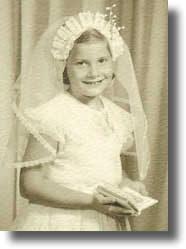Recently I watched Disney’s The Kid again. This is a movie recommended by a counselor friend of mine, and I have heard of several other counselors who assign people to watch it because of its insights into why we can become the adults we are. Bruce Willis plays a not very nice man who meets up with his 8-year-old self, and the two have some important information to give each other.
 There is a scene where a friend helps him process what it means to be talking to his little boy self, and asks, “What would I say if little Deirdre turned up, bursting out of her St. Mary’s uniform, asking me what comes next?” Suddenly, my eyes welled with tears at the thought: what would I say if little 8-year-old Susan LeClair appeared in my living room? What would I want her to know, after 30+ years of intentionally seeking “wisdom beyond my years,” the prayer the Lord instructed me to pray for myself right after becoming a Christian?
There is a scene where a friend helps him process what it means to be talking to his little boy self, and asks, “What would I say if little Deirdre turned up, bursting out of her St. Mary’s uniform, asking me what comes next?” Suddenly, my eyes welled with tears at the thought: what would I say if little 8-year-old Susan LeClair appeared in my living room? What would I want her to know, after 30+ years of intentionally seeking “wisdom beyond my years,” the prayer the Lord instructed me to pray for myself right after becoming a Christian?
Here’s my first pass:
“You are not damaged goods. You are not the ugly crippled girl you think you are. God made you beautiful, and He put you in a handicapped body to greater put His glory on display. Your frailty will make your gifts, and your intensity, less threatening to others. When His joy radiates out from you, He will get the glory, and you will love that. It’s OK that you had polio. One day, your scars will be beauty marks, and you will see that your ever-present limp simply is. It’s not a shameful thing. Jacob’s limp was the souvenir Yahweh chose for his nighttime wrestling match with Him.
“Your purity is a precious gift. Don’t let anyone steal it from you.
“Your intellect doesn’t make you better than anyone else. It’s like the color of your hair or eyes. It’s just part of the package God put together when He made you. Yes, you’re smart. Don’t be a show-off about it. That’s ugly. And nobody will figure out, especially seventh-grade girls who will leave a deep wound on your soul, that you’re desperately trying to cover up a core of shame by proving you’re not hopelessly rotten, damaged, not-OK. Speaking of which, you ARE hopelessly rotten, damaged, and not-OK in your flesh, the part of you that operates independently from God. That part of you deserves to die, and one day you’ll recognize that and it will be crucified with Jesus. Then He’ll give you a new heart and a new spirit that is whole and perfect and indescribably lovely—just like Him. You will realize that all the parts of you that you really like are all gifts from Jesus or His character shining through you.
“Oh, and Mom tells you that since your eyes change color depending on what you’re wearing, you have hazel eyes. You don’t. They’re green. Mom doesn’t know everything, but it will take you 40 more years to learn that.”
In the movie, Deirdre says she would answer little Deirdre’s question by saying, “Baby, don’t you worry about a thing. Everything’s just going to be great!” If it were me, I’d cup little Susan’s face in my hand and reassure her, “Sweetheart, I’m not going to spoil the adventure by telling you how it’s going to play out. I can just promise you that because you’ll put your trust in Jesus in college, He’s going to give you a life so full of joy that you can’t begin to imagine it right now. He’s not going to make your dreams come true; He’s going to give you new and better dreams, and make those come true. There will be pain, but the joy and richness will far outpace it. It’s going to be a delightful life, sweetie. I promise.”
What would you say to your 8-year-old self?
This blog post originally appeared at blogs.bible.org/engage/sue_bohlin/what_would_you_say_to_your_8-year-old_self on June 9, 2009.